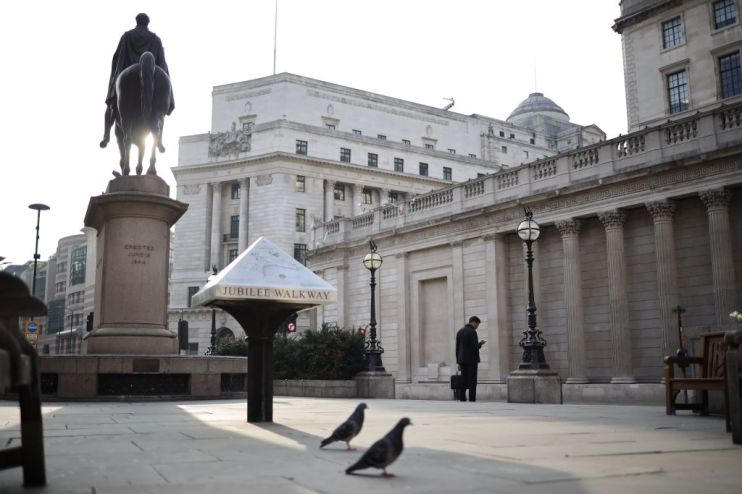FTSE 100 dragged down by coronavirus oil crash

The FTSE 100 has turned lower as a slump in oil prices hits energy companies and investor sentiment sours with coronavirus battering the economy.
Britain’s FTSE 100 was down 0.8 per cent at 5,743 points in early afternoon trading. It spent much of the morning in the green before plunging oil prices spread gloom over markets.
Stocks also turned from green to red in Europe. The continent-wide Stoxx 600 was down 0.7 per cent and Germany’s Dax was 1.2 per cent lower. France’s CAC 40 was down one per cent.
US stocks were set to tumble at the open, according to futures prices. The Dow Jones industrial average was on track to drop two per cent.
A cloud spread over global markets today as oil prices plunged. WTI crude, the US benchmark, crashed 37 per cent to a 20-year low of $11.40 per barrel. Brent crude fell six per cent to $26.40 per barrel.
The slump in the US price was driven by fears that supply capacity could soon run out despite production cuts. Demand has evaporated during the coronavirus slowdown, sending prices crashing.
Falling Brent oil prices hurt the energy-heavy FTSE 100. BP fell 3.4 per cent to 293p while energy group Centrica slid 2.7 per cent to 31p.
European losses “may well accelerate once the US gets involved,” said Connor Campbell, market analyst at trading platform Spreadex.
US markets are set to be particularly hard-hit by the tumbling WTI price. Speculation is rising that President Donald Trump may have to bail out the massive shale oil industry, which breaks even at roughly $40 per barrel.
FTSE 100 held back by lengthy lockdown
The FTSE 100 was also weighed down by intense and divisive discussions about when coronavirus lockdown measures can be eased.
UK Prime Minister Boris Johnson, who is himself recovering from Covid-19, reportedly told colleagues that he is not keen on easing the measures due to the threat of a second wave of infections, according to The Times.
Chancellor Rishi Sunak and cabinet secretary Michael Gove are pushing for some restrictions to be lifted soon to avoid economic instability. Bank of England deputy governor Ben Broadbent today said it was “not impossible” that UK GDP would plunge 35 per cent in the second quarter.
The pound came under pressure as the UK lockdown looked set to stay in place and as the death toll from Covid-19 rose. Britain reported 596 deaths in hospitals in its daily update yesterday, raising the total to more than 16,000.
Sterling was 0.5 per cent lower against the dollar at $1.244. The dollar strengthened on an index as investors moved out of equities and into safe assets.
The yield on the US 10-year government bond, seen as the safest asset money can buy, fell three basis points (0.03 percentage points) to 0.616 per cent. Yields move inversely to prices.
Investors nervy during earnings season
Earnings season was also on investors’ minds, with firms around the world set to reveal losses or huge drops in profit as coronavirus all but closes economies.
Last week, US banks set aside tens of billions of dollars to deal with loan losses and reported huge drops in profit.
Craig Erlam, market analyst at currency firm Oanda, said: “This is the first real insight we’ve had into the impact on companies bottom lines and the initial readings are ugly.”
“Investors have given a free pass to the data until now, they may not be so forgiving in the coming weeks.”